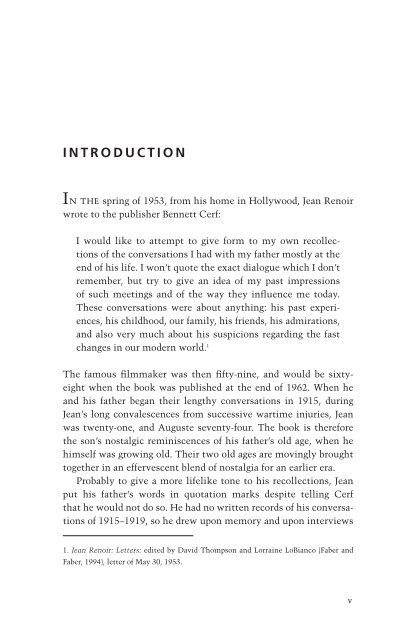Renoir, My Father Introduction - The New York Review of Books
Renoir, My Father Introduction - The New York Review of Books Renoir, My Father Introduction - The New York Review of Books
THIS IS A NEW YORK REVIEW BOOK PUBLISHED BY THE NEW YORK REVIEW OF BOOKS 1755 Broadway, New York, NY 10019, USA Copyright © 1958, 1962 by Jean Renoir Introduction Copyright © 2001 by Robert Herbert All rights reserved. Library of Congress Cataloging-in-Publication Data Renoir, Jean, 1894- [Pierre-Auguste Renoir, mon père. English] Renoir : my father / Jean Renoir ; introduction by Robert Herbert ; translated by Randolph and Dorothy Weaver. p. cm. Originally published: Boston : Little, Brown, 1962. Includes index. ISBN 0-940322-77-3 1. Renoir, Auguste, 1841-1919. 2. Painters—France—Biography. I. Title. ND553.R45 R42813 2001 759.4—dc21 2001002539ISBN 0-940322-77-3 Cover painting: Pierre-Auguste Renoir, The Garden in the rue Cortot, Montmartre (detail), 1876 Courtesy of the Carnegie Museum of Art, Pittsburgh; acquired through the generosity of Mrs. Alan M. Scaife Cover design: Katy Homans Book design by Lizzie Scott Printed in the United States of America on acid-free paper. 10 9 8 7 6 5 4 3 2 1 September 2001 www.nybooks.com
INTRODUCTION IN THE spring of 1953, from his home in Hollywood, Jean Renoir wrote to the publisher Bennett Cerf: I would like to attempt to give form to my own recollections of the conversations I had with my father mostly at the end of his life. I won’t quote the exact dialogue which I don’t remember, but try to give an idea of my past impressions of such meetings and of the way they influence me today. These conversations were about anything: his past experiences, his childhood, our family, his friends, his admirations, and also very much about his suspicions regarding the fast changes in our modern world. 1 The famous filmmaker was then fifty-nine, and would be sixtyeight when the book was published at the end of 1962. When he and his father began their lengthy conversations in 1915, during Jean’s long convalescences from successive wartime injuries, Jean was twenty-one, and Auguste seventy-four. The book is therefore the son’s nostalgic reminiscences of his father’s old age, when he himself was growing old. Their two old ages are movingly brought together in an effervescent blend of nostalgia for an earlier era. Probably to give a more lifelike tone to his recollections, Jean put his father’s words in quotation marks despite telling Cerf that he would not do so. He had no written records of his conversations of 1915–1919, so he drew upon memory and upon interviews 1. Jean Renoir: Letters: edited by David Thompson and Lorraine LoBianco (Faber and Faber, 1994), letter of May 30, 1953. v
- Page 1 and 2: RENOIR, MY FATHER JEAN RENOIR INTRO
- Page 3: RENOIR, MY FATHER JEAN RENOIR Trans
- Page 7 and 8: Introduction Equally moving is Jean
- Page 9: Introduction inative reconstruction
INTRODUCTION<br />
IN THE spring <strong>of</strong> 1953, from his home in Hollywood, Jean <strong>Renoir</strong><br />
wrote to the publisher Bennett Cerf:<br />
I would like to attempt to give form to my own recollections<br />
<strong>of</strong> the conversations I had with my father mostly at the<br />
end <strong>of</strong> his life. I won’t quote the exact dialogue which I don’t<br />
remember, but try to give an idea <strong>of</strong> my past impressions<br />
<strong>of</strong> such meetings and <strong>of</strong> the way they influence me today.<br />
<strong>The</strong>se conversations were about anything: his past experiences,<br />
his childhood, our family, his friends, his admirations,<br />
and also very much about his suspicions regarding the fast<br />
changes in our modern world. 1<br />
<strong>The</strong> famous filmmaker was then fifty-nine, and would be sixtyeight<br />
when the book was published at the end <strong>of</strong> 1962. When he<br />
and his father began their lengthy conversations in 1915, during<br />
Jean’s long convalescences from successive wartime injuries, Jean<br />
was twenty-one, and Auguste seventy-four. <strong>The</strong> book is therefore<br />
the son’s nostalgic reminiscences <strong>of</strong> his father’s old age, when he<br />
himself was growing old. <strong>The</strong>ir two old ages are movingly brought<br />
together in an effervescent blend <strong>of</strong> nostalgia for an earlier era.<br />
Probably to give a more lifelike tone to his recollections, Jean<br />
put his father’s words in quotation marks despite telling Cerf<br />
that he would not do so. He had no written records <strong>of</strong> his conversations<br />
<strong>of</strong> 1915–1919, so he drew upon memory and upon interviews<br />
1. Jean <strong>Renoir</strong>: Letters: edited by David Thompson and Lorraine LoBianco (Faber and<br />
Faber, 1994), letter <strong>of</strong> May 30, 1953.<br />
v



